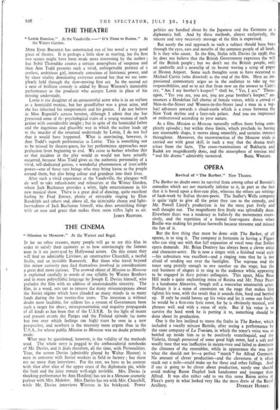Revival of 4 , The Barber." New Theatre.
OPERA
The Barber no doubt owes its survival from among other of Rossini's comedies which are not musically inferior to it, in part to the fact that it is based upon a first-rate play, wheteas the others are settings of hack-work by Italian theatre-poets. The Sadler's Wells company' is quite -right to give all the point they can to the comedy, and Mr. Powell Lloyd's production is for the most part lively and well thought out. The magnificent first finale was splendidly done. Elsewhere there was a tendency to ballet-fy the movements exces- sively, and the repetition of a formal four-square dance when Basilio was making his profuse farewells became tiresome and missed the fun of it.
But the first thing that must be done with The Barber, of all operas, is to sing it. The company is fortunate in having a Figaro who can sing out with that full expansion of vocal tone that Italian opera demands. Mr. Brian Donlevy has always been a clever artist and character-actor. He is now a singer with a finished vocal style —his coloratura was excellent—and a ringing tone that he is not afraid of sending out over the footlights. The soprano and the tenor sang prettily enough to one another on the stage, but the real business of singers is to sing to the audience while, appearing to be engaged in their private colloquies. This apart, Miss Rose Hill made a quite enchanting minx of Rosina and Mr. Peter Pears is a handsome Altnaviva, !hough still a somewhat amateurish actor. Perhaps it is a sense of constraint on the stage that makes him tighten his tone, with the result that it sounds thin, hard and bottled
up. If only he could loosen up his voice and let it come out freely, he would be a first-rate lyric tenor, for he is obviously musical, and phrases well and with a sense of style. But if his voice is to survive the hard work he is putting it to, something should be done about its production.
One is the less inclined to stress the faults in The Barber, which included a vocally miscast Bartolo, after seeing a performance by the same company of La Traviata, in which the tenor's voice was so
bottled up inside him as to be positively ventriloquial, and the Violetta, though possessed of some good high notes, had a soft and woolly tone that was ineffective in mezza-voce and failed to dominate
the climaxes of the ensembles, while in appearance she was just what she should-. not be—a perfect " match " for Alfred Germont No amount of clever production—and the cleverness of it often stuck out a mile—could make up for these and other failings. And if one is going to be clever about production, surely one should avoid making Baron Duphol look handsomer and younger than Alfred. It was also rather odd to see this same Baron arrive at Flora's party in what looked very like the mess dress of the Royal






















 Previous page
Previous page